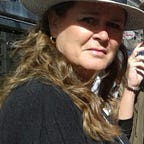VC money are all the rage within the indie beauty brand community.
For this let’s go back to Brighton, England.
In the year 1976, Anita Roddick started a tiny store in Brighton, England.
It was a cheeky little store called “The Body Shop”.
Cheeky because as Anita herself said,
“It was hard (to start up). It was breathtakingly funny. I was stuck between two funeral parlours who objected to the name The Body Shop because coffins would pass by a couple of times a day.”
Despite the rather ordinary name, it’s not the products that got the attention of its customers — and subsequently the attention of the world’s press.
Because you see, Anita’s products were simply beauty products for women.
Yet, Anita wasn’t talking to all women. She wasn’t speaking to women who used beauty products.
But instead she spoke to a specific problem.
At the time the ingredients of beauty products were tested on animals. And Anita was tackling this specific issue: the problem of ethical consumerism.
I know little about the funeral parlours. But we do know that Anita Roddick went on to create a business that millions of women were attracted to.
And it year 2006, when Anita finally decided to sell the business to L’Oreal, she did so for a cool fee of GBP 652 million!
And sadly not long after selling her business Anita passed away.
Think about it. A tiny business. A business not a heck of lot different from those funeral parlours that were simply appealing to a demographic.
Yet Anita changed it all by appealing to a profile.
Who does your beauty brand appeal to?
Hi, I’m Charlotte Fnug. I write a weekly newsletter on Friday called Beauty Musings where I sling pure gold for Beauty Brand Founders, like you.
